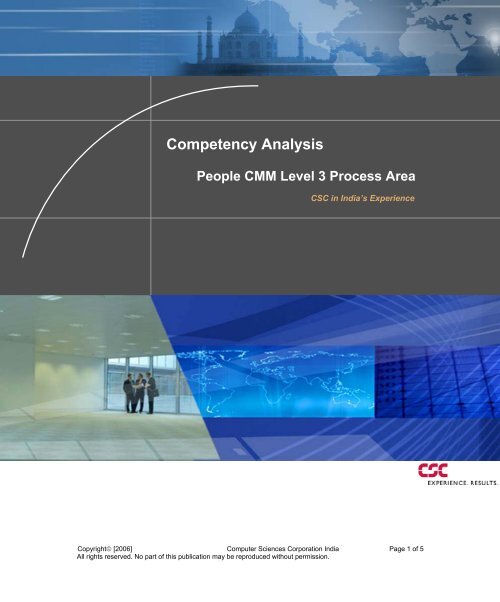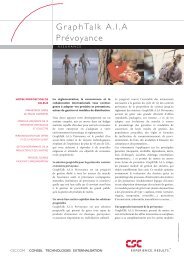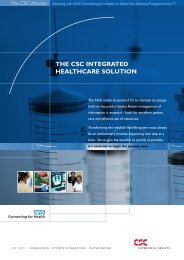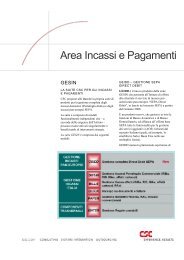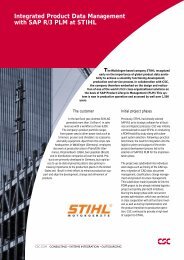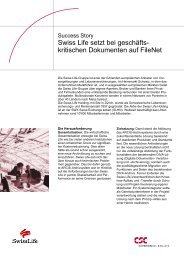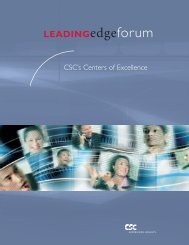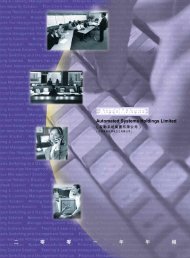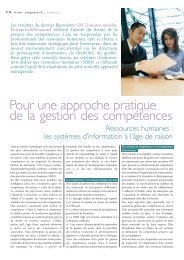Competency Analysis - CSC
Competency Analysis - CSC
Competency Analysis - CSC
You also want an ePaper? Increase the reach of your titles
YUMPU automatically turns print PDFs into web optimized ePapers that Google loves.
<strong>Competency</strong> <strong>Analysis</strong><br />
People CMM Level 3 Process Area<br />
<strong>CSC</strong> in India’s Experience<br />
Copyright© [2006] Computer Sciences Corporation India Page 1 of 5<br />
All rights reserved. No part of this publication may be reproduced without permission.
Challenge<br />
<strong>Competency</strong> analysis is necessary to identify the knowledge, skills and process abilities<br />
required to perform the organisation’s business activities so that they may be<br />
developed and used as a basis for workforce practices.<br />
<strong>CSC</strong> in India did not have competency analysis framework, thereby having no<br />
competencies defined for any role. The challenge was to formalise the competency<br />
analysis process starting from identification of workforce competencies required to<br />
perform the business activities to utilisation of competency information for workforce<br />
activities like staffing, training and development and competency development.<br />
To address these gaps, the organisation has established a competency analysis<br />
system where employees can map themselves against the competencies defined for<br />
their current and future roles.<br />
> Methodology<br />
<strong>Competency</strong> analysis begins with identification of the workforce competencies required<br />
to perform the organisational business activities. Once the competencies are identified,<br />
a mapping between the targeted vs actual value of competencies is required to<br />
measure, analyse and predict the future capability of competencies and take necessary<br />
corrective/preventive action to either enhance or maintain the current capability.<br />
Employee Speak<br />
I am proud to be a part of <strong>CSC</strong> in India<br />
where opportunities are provided for<br />
employees’ improvement.<br />
For an employee<br />
focused<br />
organisation,<br />
employee<br />
development tops<br />
the priority list.<br />
<strong>CSC</strong> in India demonstrates this by<br />
facilitating its employees to attend<br />
various training courses.<br />
To identify the development areas,<br />
many tools are used like training need<br />
survey, inputs from appraisal feedback,<br />
individual development plan, role<br />
based trainings, project needs and<br />
topics identified through competency<br />
analysis.<br />
Identifying the tasks, skills, knowledge and attitude required to perform various<br />
organisational roles can be used in formulating job description, assessing employees’<br />
current level of competency, and activities like planning career development and<br />
coordinating competency development.<br />
<strong>CSC</strong> in India uses an automated tool to maintain a repository of workforce<br />
competencies. A set of definitions of all the tasks required for a particular role and skills<br />
and knowledge required to perform those tasks is termed as job dictionary. The<br />
requisite competencies for all the roles within a particular workgroup are called job<br />
family. Refer to Figure 1 for a detailed description of the <strong>CSC</strong> in India’s methodology on<br />
competency analysis practices:<br />
The direct and most powerful tool is<br />
competence analysis. I am using this<br />
tool to identify the improvement areas<br />
for myself and my team members. This<br />
tool has helped us identify the gaps<br />
between the existing level and<br />
expected level for each specific role<br />
and thus helped in identifying the<br />
development areas.<br />
-Chandrakant Shrikrishna Bhagwat<br />
<strong>CSC</strong> Employee Indore<br />
Copyright© [2006] Computer Sciences Corporation India Page 2 of 5<br />
All rights reserved. No part of this publication may be reproduced without permission.
Figure 1 – <strong>Competency</strong> <strong>Analysis</strong> Process<br />
Copyright© [2006] Computer Sciences Corporation India Page 3 of 5<br />
All rights reserved. No part of this publication may be reproduced without permission.
Innovations Introduced<br />
<strong>CSC</strong> in India focuses towards periodic reassessment of workforce competencies to ensure<br />
they remain current with the knowledge, skills and process abilities required by the<br />
organisation’s business activities. Various innovations with this regard are:<br />
• Formalisation and automation of competency analysis database to define<br />
competencies in terms of tasks, skills and knowledge required for different roles in the<br />
organisation<br />
• Alignment of various workforce activities with the competency analysis framework<br />
• Self-mapping of employees against the competencies for their current or next<br />
immediate role<br />
• Utilisation of competency information across all PCMM levels including training, career<br />
development, competency development, recruitment and mentoring<br />
• Training on competency framework to generate awareness among employees to<br />
participate and contribute in this initiative<br />
• Alignment of India-specific competencies with the organisational global roles and<br />
requisite set of competencies<br />
• <strong>Competency</strong> Capability Baseline (CCB) to measure, analyse and predict the current<br />
and future capability of the competencies as per the business needs and take<br />
necessary corrective/preventive action to either enhance or maintain the current<br />
capability<br />
• Periodic review of competency mapping by employees to remain current with the<br />
organisation’s business needs<br />
• Periodic review of the skills and knowledge required to perform a particular role<br />
ensuring they are complete and correct<br />
<strong>Competency</strong> <strong>Analysis</strong><br />
Goals<br />
• The workforce<br />
competencies required to<br />
perform the organisation’s<br />
business activities are<br />
defined and updated.<br />
• The work processes used<br />
within each workforce<br />
competency<br />
are<br />
established<br />
and<br />
maintained.<br />
• The organisation tracks its<br />
capability in each of its<br />
workforce competencies.<br />
• <strong>Competency</strong> <strong>Analysis</strong><br />
practices<br />
are<br />
institutionalised to ensure<br />
they are performed as<br />
defined organisational<br />
processes.<br />
> Impact<br />
Our work analysis identifies the competencies that are most important to the successful performance of the targeted job. Other<br />
benefits include:<br />
• Objective gap analysis of employees’ competencies resulting in individual development for an employee’s current and future<br />
role<br />
• Reduced interview vs. selection ratio as a result of competency based assessment at the time of hiring<br />
• Self-development of more than 90% of employees in their competencies in respective domains, communication skills and<br />
leadership skills<br />
• Increased transparency in the job expectations for an individual’s current or future role<br />
Copyright© [2006] Computer Sciences Corporation India Page 4 of 5<br />
All rights reserved. No part of this publication may be reproduced without permission.
• Improved employee-organisation fit with employees having more clarity on their role towards achieving the company’s<br />
goals<br />
• Significant improvement in overall organisational competencies with the mandatory competencies check done at the time<br />
> References<br />
http://www.sei.cmu.edu/cmm-p/version2/part3.pdf<br />
LN-Apps/PCMM/PCMM Repository (Internal to <strong>CSC</strong> in India)<br />
> Contacts<br />
For any further inquiry/information, please contact:<br />
Girish Kumar Khatri<br />
Project Manager - People CMM<br />
Corporate HR<br />
Mailing Address<br />
Computer Sciences Corporation (<strong>CSC</strong>) India<br />
Pvt. Ltd.<br />
C-29, Sector-58<br />
Noida - 201 301 (U.P.), INDIA<br />
Contact details<br />
Telephone - +91-120-3913023, Extn.-1377<br />
Fax - +91-120-3913095<br />
Cell - +91-9811772521<br />
E-mail - gkhatri@csc.com<br />
©<br />
Copyright© [2006] Computer Sciences Corporation India Page 5 of 5<br />
All rights reserved. No part of this publication may be reproduced without permission.


